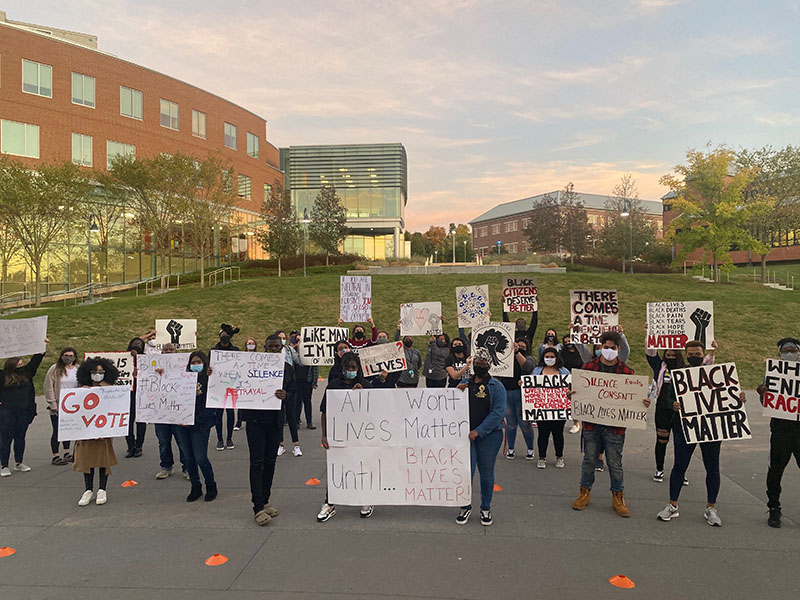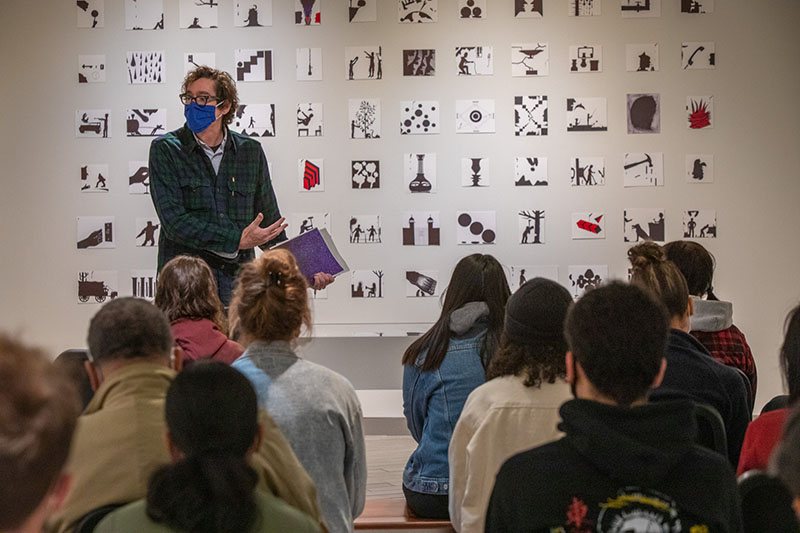- Apply
- Visit
- Request Info
- Give
JEDI: Faculty group takes on racial injustice
Written by Dwight Bachman
Published on February 23, 2022

Nationwide suppression of voting rights; police brutality and the murder of unarmed African Americans; and other signs of overt discrimination and social injustice throughout our society are all indicators that racism in the United States has renewed strength. In the aftermath of the murder of George Floyd in May 2020, Eastern Connecticut State University’s student chapter of the NAACP provided leadership in a campus-wide dialog on how to address racism and encourage diversity, equity and inclusion on campus.
To support this initiative, a group of faculty organized the Justice, Equity, Diversity and Inclusion (JEDI) group in spring 2021 to address racial injustice in the classroom and support Black, Indigenous and other People of Color (BIPOC) students at Eastern. The JEDI mission states: “The JEDIs are a group of faculty members who are motivated and determined to create a campus-wide climate that best supports Eastern Connecticut State University’s BIPOC students.”
“JEDI is not a formal committee, but a fluid group of faculty from across the university who envision a path forward to address the profound challenges facing the nation,” said Sociology Professor Cara Bergstrom-Lynch, chair of the Department of Sociology, Anthropology, Criminology and Social Work. “The group has come together to share ideas and support each other’s JEDI work in the classroom and in its programs. So many faculty are doing amazing work on campus. We are a loose-knit group that gets together to discuss antiracism on campus, in our classrooms, in our scholarship and more. We welcome any faculty member across campus who wishes to join, with no obligation to attend any given meeting.”

This past summer, several JEDIs attended a Virtual Summer Institute on Racial Justice and Public Liberal Arts to discuss best practices by member institutions of the Council of Public Liberal Arts Colleges (COPLAC), of which Eastern is a part. “Our racial justice work dismantles and disrupts the white supremacist foundations of our institutions and society,” notes the institute’s Statement of Beliefs. “As public institutions, we must intentionally place accountability into our procedures. JEDIs believe racial justice is a holistic activity that should be valued as a ‘must have’ activity instead of a ‘good to have’ activity. JEDI work should be valued not demonized.”
In addition to Bergstrom-Lynch, other Eastern faculty involved with JEDI include Education Professor David Stoloff, Kristen Morgan, associate professor of theatre; Biology Professor Elizabeth Cowles; Librarian Kellie O’Donnell-Bobadilla; Health Sciences Professor Anita Lee; Psychology Professor Krsitalyn Salters-Pedneault; Environmental Earth Science Professor Peter Drzewiecki; Political Science Professor Martin Mendoza-Botelho; Theresa Bouley, professor of education; Brian Day, assistant professor of filmmaking; Art Gallery Director Julia Wintner; Psychology Professor Peter Bachiochi; Darcy Parker Bruce, adjunct professor of theatre; and Jennifer Beck, lecturer in English.
One can find examples of faculty initiatives to support JEDI principles throughout the campus. Bergstrom-Lynch had her students read more works by scholars of color who approach studies of race and racism from a critical perspective. She has also revised significant portions of her Senior Seminar and developed an anti-racist pedagogy tool kit to help students and faculty understand the importance of being culturally responsive. “I have found our conversations and analysis of race and racism to be deeper and more nuanced because of these changes,” she said.
Stoloff, who for years has had an ongoing interest in intercultural connections among universities, hosted a video conference with students and faculty from five universities. “Students and faculty discussed culture, education, sustainable development and media across nations,” said Stoloff. “We hope to have several more of these sessions.”
JEDI faculty have collaborated in classroom discussions on two new books co-authored by Professor Bouley: “Implicit Bias: An Educator’s Guide to the Language of Microaggressions” and “The Economic and Opportunity Gap.” Bouley said the joint classes also had incisive discussions on the book “Nice Racism” by Robin DeAngelo.
Wintner presented a student art exhibition in Wood Support Services and “The Artist as Witness” in the Art Gallery, to which several JEDI members sent their classes. “These artists give history a physical presence,” said Wintner. “They render solid proof of unjust events so that they become impossible to ignore. This exhibition is our modest contribution to the ubiquitous and necessary attention to today’s art world to social injustice.”
Day is producing a documentary series with Morgan about the use of migrant labor in Connecticut’s tobacco industry and its impact on civil rights and the state’s diversity. “Our documentary series, ‘Stepping into the Shade,’ explores the history of tobacco in the state, the use of migrant labor from HBCUs, Jamaica, Puerto Rico and more. It is a very interesting and important story and it keeps growing as we develop it.”
Morgan has also used her design and technical skills to produce a JEDI newsletter, showcasing the racial justice and equity work on campus. Check it out at https://indd.adobe.com/view/73fa3732-0338-44b9-9d3d-b39d5e9ee251
Bergstrom-Lynch says that while JEDI has no budget, the Office of Equity and Diversity has provided up to $1,000 this year for mini-grants. She encourages all full-time faculty or staff to apply to the JEDI group for specific projects designed to support students of color. Projects could include diversifying student enrollment, purchasing books for faculty or student book clubs, incentives to support student involvement in focus groups or survey participation and other initiatives. To apply for a mini grant (due March 15), visit https://sites.google.com/view/eastern-jedi-faculty/mini-grants .




